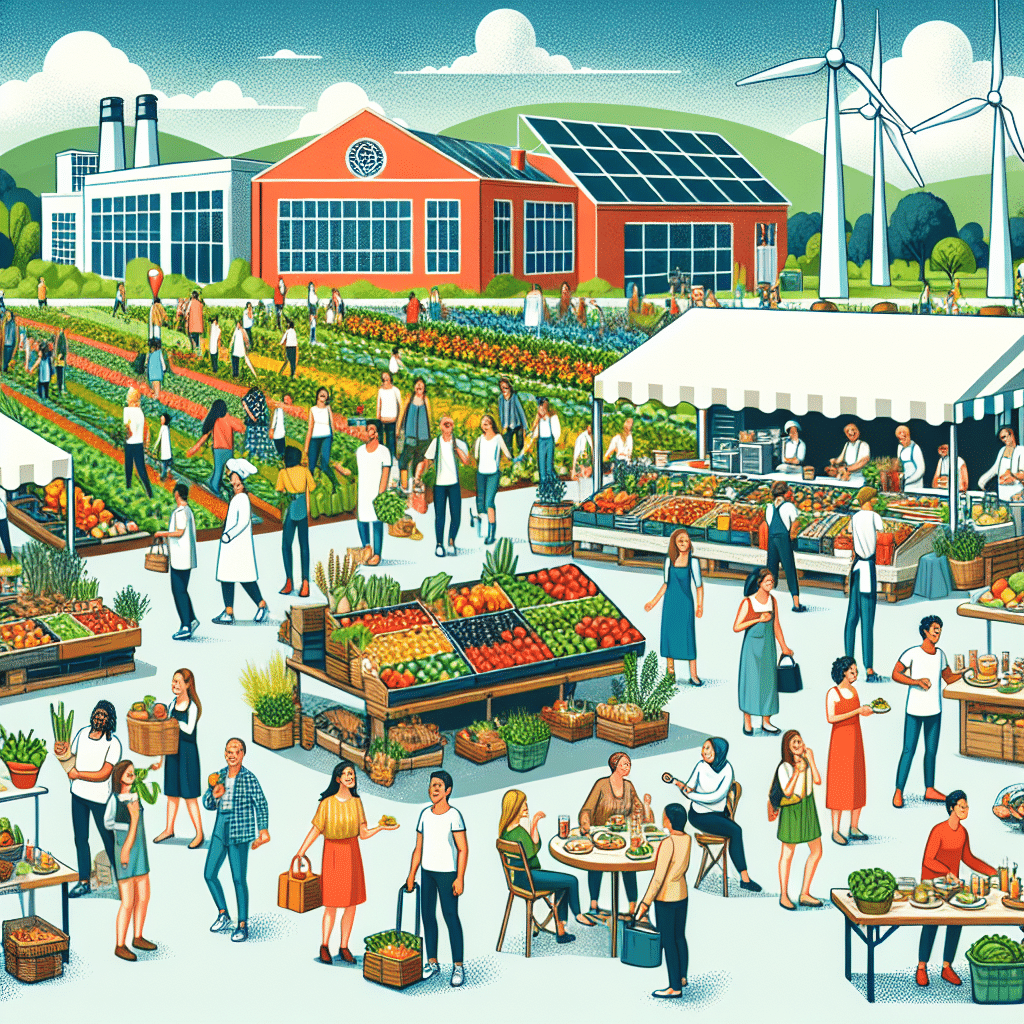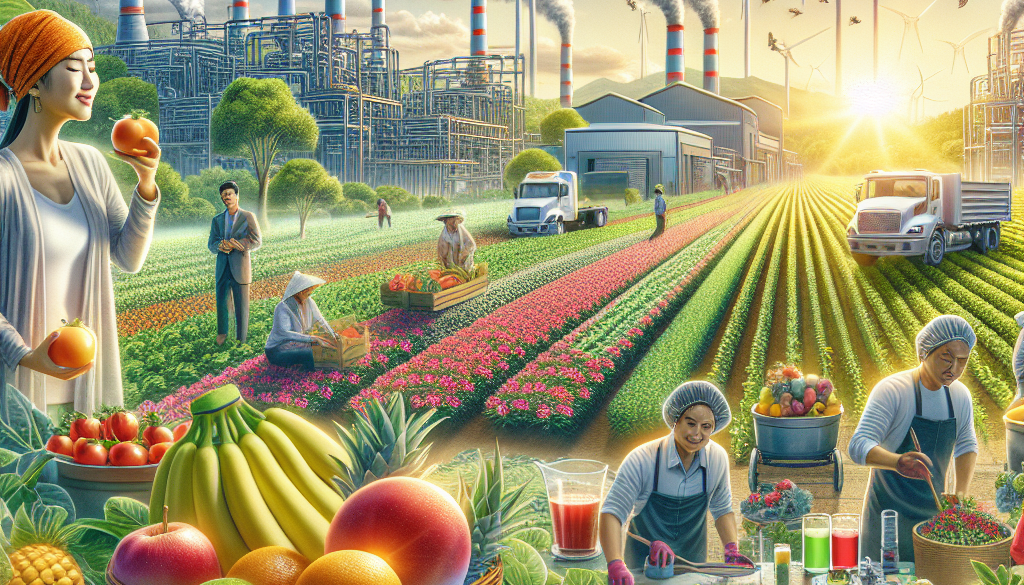Sustainability Movement: Food and Beverage Industry’s Growth
-
Table of Contents
- Sustainability Movement: Driving Growth in the Food and Beverage Industry
- The Rise of Eco-Conscious Consumers
- Key Areas of Sustainable Development
- Case Studies: Pioneers of Sustainability
- Statistics: The Impact of Sustainability on Growth
- Challenges and Opportunities
- Conclusion: The Future is Sustainable
- ETChem: Leading the Way with Sustainable Protein Products
Sustainability Movement: Driving Growth in the Food and Beverage Industry

The food and beverage industry is undergoing a significant transformation, driven by the increasing consumer demand for sustainable practices. As awareness of environmental issues grows, companies within this sector are recognizing the importance of adopting eco-friendly methods to ensure their long-term viability and cater to the conscientious consumer. This article explores the sustainability movement within the food and beverage industry, highlighting the growth opportunities it presents, and showcasing how businesses are adapting to this new paradigm.
The Rise of Eco-Conscious Consumers
Consumer behavior has shifted dramatically in recent years, with a growing number of individuals seeking out products that align with their values. This trend is particularly evident in the food and beverage sector, where sustainability has become a key factor in purchasing decisions. A survey by Nielsen found that 73% of global consumers would definitely or probably change their consumption habits to reduce their environmental impact. This shift is driving companies to reevaluate their practices and invest in sustainable solutions.
Key Areas of Sustainable Development
The sustainability movement in the food and beverage industry encompasses several key areas, including:
- Reducing carbon footprint
- Minimizing water usage
- Implementing ethical sourcing
- Reducing waste and improving packaging
- Encouraging plant-based diets
Each of these areas offers opportunities for growth and innovation, as companies strive to meet the demands of eco-conscious consumers while also benefiting the planet.
Case Studies: Pioneers of Sustainability
Several companies have emerged as leaders in the sustainability movement, setting examples for others in the industry. For instance:
- Patagonia Provisions – A branch of the outdoor clothing giant, Patagonia Provisions focuses on regenerative organic agriculture, offering products that support biodiversity and soil health.
- Impossible Foods – Known for its plant-based meat alternatives, Impossible Foods aims to reduce the environmental impact of food production by offering delicious and sustainable options.
- PepsiCo – With its “Performance with Purpose” agenda, PepsiCo has committed to sourcing sustainable ingredients and reducing its carbon footprint and water usage.
These companies not only contribute positively to the environment but also enjoy increased brand loyalty and market share as a result of their sustainable practices.
Statistics: The Impact of Sustainability on Growth
The correlation between sustainability and growth in the food and beverage industry is supported by compelling statistics:
- A report by the Business & Sustainable Development Commission suggests that sustainable business models could open economic opportunities worth up to $12 trillion by 2030.
- According to the Carbon Trust, brands that clearly communicate their sustainability credentials can increase product sales by up to 66%.
- The plant-based food market is expected to reach $74.2 billion by 2027, growing at a CAGR of 11.9% from 2020, as reported by Meticulous Research.
These figures highlight the significant economic potential of sustainable practices within the food and beverage industry.
Challenges and Opportunities
While the shift towards sustainability presents numerous opportunities, it also poses challenges for food and beverage companies. These include the need for:
- Investment in new technologies and processes
- Development of supply chains that prioritize sustainability
- Education and communication to inform consumers about sustainable options
- Adaptation to regulatory changes and standards
Companies that successfully navigate these challenges can gain a competitive edge and secure their position as leaders in the sustainable food and beverage market.
Conclusion: The Future is Sustainable
The sustainability movement is not just a trend but a fundamental shift in the food and beverage industry. As consumers increasingly prioritize environmental impact in their purchasing decisions, companies that embrace sustainable practices are poised for growth. By investing in eco-friendly technologies, ethical sourcing, and waste reduction, businesses can meet the demands of the modern consumer while contributing to a healthier planet. The future of the food and beverage industry is undeniably green, and those who lead the charge will reap the benefits.
ETChem: Leading the Way with Sustainable Protein Products
In line with the sustainability movement, ETChem is at the forefront of providing eco-friendly protein products. Their range of collagens, including marine, fish, bovine, and chicken collagens, are produced with a commitment to environmental responsibility. ETChem’s products are characterized by their neutral taste and instant solubility, making them ideal for various applications in the food and beverage industry.
ETChem’s dedication to sustainability and quality has made them a trusted supplier for leading global brands. By choosing ETChem’s protein products, companies can ensure they are aligning with sustainable practices and meeting consumer expectations for eco-friendly options.
About ETChem:
ETChem, a reputable Chinese Collagen factory manufacturer and supplier, is renowned for producing, stocking, exporting, and delivering the highest quality collagens. They include marine collagen, fish collagen, bovine collagen, chicken collagen, type I collagen, type II collagen and type III collagen etc. Their offerings, characterized by a neutral taste, instant solubility attributes, cater to a diverse range of industries. They serve nutraceutical, pharmaceutical, cosmeceutical, veterinary, as well as food and beverage finished product distributors, traders, and manufacturers across Europe, USA, Canada, Australia, Thailand, Japan, Korea, Brazil, and Chile, among others.
ETChem specialization includes exporting and delivering tailor-made collagen powder and finished collagen nutritional supplements. Their extensive product range covers sectors like Food and Beverage, Sports Nutrition, Weight Management, Dietary Supplements, Health and Wellness Products, ensuring comprehensive solutions to meet all your protein needs.
As a trusted company by leading global food and beverage brands and Fortune 500 companies, ETChem reinforces China’s reputation in the global arena. For more information or to sample their products, please contact them and email karen(at)et-chem.com today.




